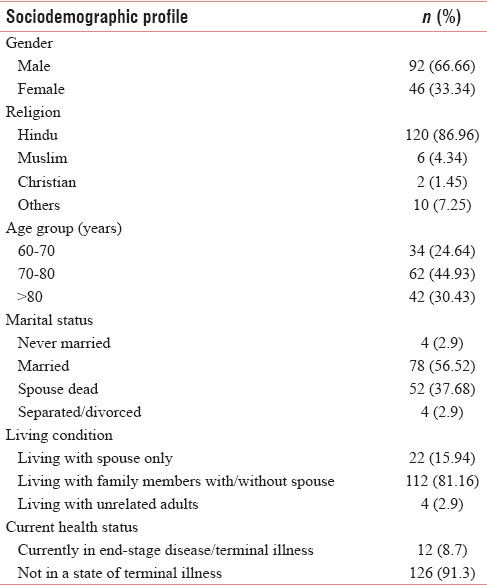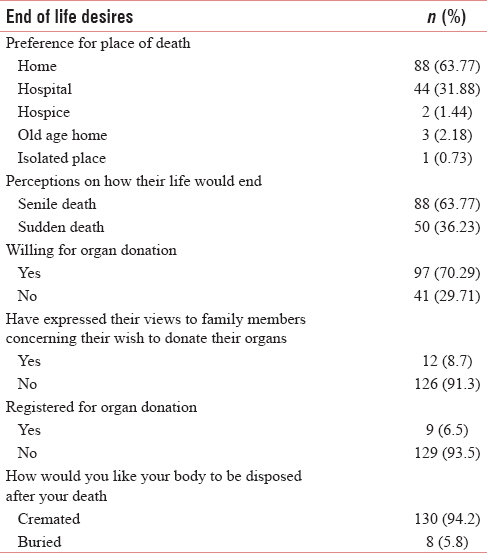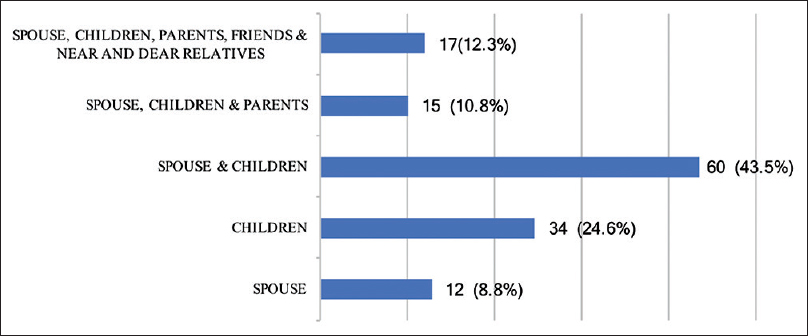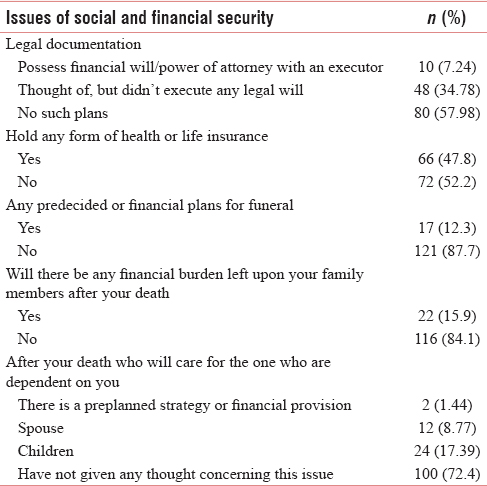Translate this page into:
End-of-life Care and Social Security Issues among Geriatric People Attending a Tertiary Care Hospital of Eastern India
Address for correspondence: Dr. Lipilekha Patnaik, Department of Community Medicine, Institute of Medical Sciences and SUM Hospital, Siksha ‘O’ Anusandhan Deemed to be University, Bhubaneswar, Kalinga Nagar, Ghatikia, Bhubaneswar - 751 003, Odisha, India. E-mail: drlipilekha@yahoo.co.in
This is an open access journal, and articles are distributed under the terms of the Creative Commons Attribution-NonCommercial-ShareAlike 4.0 License, which allows others to remix, tweak, and build upon the work non-commercially, as long as appropriate credit is given and the new creations are licensed under the identical terms.
This article was originally published by Medknow Publications & Media Pvt Ltd and was migrated to Scientific Scholar after the change of Publisher.
Abstract
Context:
The care of sick members is the hallmark of a civilized society. End-of-life care and social security for elderly are emerging issues nowadays.
Aims:
The aim of this study is to explore the desires of the elderly regarding the end-of-life care decisions along with to find out social security measures among the study population.
Settings and Design:
The cross-sectional study conducted in the geriatric outpatient department of a tertiary care hospital.
Subjects and Methods:
The study period was 4 months from August to November 2017. The geriatric patients attending geriatric outpatient department were interviewed using a predesigned and pretested questionnaire. Convenient sampling was used and a total of 138 participants were included in the study.
Statistical Analysis Used:
Proportions were used in the study.
Results:
A total of 63.77% participants expected to die at home surrounded by their family members during their time of death followed by hospital (31.88%). Majority (63.77%) stated their opinions to die a senile death. Organ donation after death was the willingness shown by as high as 70.3%, but registered organ donors were 6.5%. 94.2% participants expected to be cremated after their death while others buried in accord to their religious practices. Only 7.24% of participants had a legal will of their financial establishments. It was observed that even half of the population (47.8%) did not have any form of health or life insurance.
Conclusion:
Home-based care of the elderly is needed so that they can live their last days of life peacefully. Awareness about health and life insurance should be increased by urgent intervention.
Keywords
Elderly
end-of-life desires
health insurance
INTRODUCTION
The care of sick members is the hallmark of a civilized society. Many countries are now making arrangements for end-of-life care of their people depending on their choice.[1] Helping people to stay at their preferred place during the end of their life is considered as an extension of health-care services.[234] The place of death is of considerable interest now, yet few studies have determined public preferences of end-of-life care for final days of life.[567] For many people, home is more than a physical space; it represents familiarity, the presence of loved ones, and the possibility of enjoying “normal” life. This is the reason why most of the people with a progressive illness want to die at home.[8] Although longevity is a good economic indicator for the progress of a developing country like India, it leads to social and economic challenges.[9]
Social security is a basic human right. The older persons need social security as they cannot work and earn due to age.[91011] The social security needs of elderly persons consist of food, clothing, shelter, health care, and emotional support.[12] It may be provided by social assistance or social insurance or a combination of both. Adequate social security measures and affirming it by law are the norm in many advanced nations, and this concept is in a nascent stage in India.[12] The object of social security is to provide livelihood to those who cannot earn their livelihood by work for chronic or temporary reasons.[11]
Limited studies are available in India exploring end-of-life desires and social security measures among elderly.
Aims
The aim of this study is to explore the desires of the elderly regarding the end-of-life care decisions along with to find out social security measures among the study population.
SUBJECTS AND METHODS
Study design
A hospital-based cross-sectional study was conducted in a tertiary care hospital in a period of 4 months, from August to November 2017. The geriatric patients who attended the geriatric outpatient department during this period were included in the study. During this period of 4 months, collection of data was actually done for 3 months. Patients aged 60 years and above were included after taking consent. On an average, 3–4 respondents were interviewed per day, 5 days a week. A total of 302 patients were contacted, out of which 164 did not agree to participate, thus a total of 138 cases were interviewed.
Ethical clearance was obtained from the Institutional Ethical Committee and informed written consent was obtained from all the study participants, after thoroughly explaining them the prospect of the study. Confidentiality was ensured at all stages. Participants were informed about the right to discontinue participation at any time without giving reasons and that refraining should not influence their individual care.
Inclusion criteria and exclusion criteria
Patients registered on the day of interview were selected using simple random sampling method. Patients aged 60 years and above were included in the study. Too sick patients who could not revert verbally and patients who were reluctant and refused to participate were excluded from the study.
Data collection and analysis
For the recording of data, a schedule was prepared. At the beginning of the study, this instrument was pretested to test the feasibility, reliability, and validity of the questions while eliciting the required information. Accordingly, the questionnaire/schedule was modified, corrected, and finalized for data collection. Content validity was done by experts in the field from the Department of Geriatrics, Medicine, and Community Medicine.
Collection of data was done in a friendly atmosphere after obtaining informed consent. Some time was spent, at the beginning, on informal discussions with the purpose of gaining the confidence of the study participants. Data in respect of sociodemographic profile, end-of-life desires, issues of social security, etc., were collected. Data were cleaned on the day of data collection and entered into Excel sheet on the same day. Data were finally compiled and analyzed by SPSS software version 20.0 (IBM Corp., Armonk, NY, USA).
RESULTS
A total of 302 patients were contacted, out of which 164 did not agree to participate, thus a total of 138 persons were interviewed. This large number of denial (almost 55%) among geriatric patients was a very astonishing outcome during our research pertaining to the fact that most of them were not interested in discussing any affair concerning death or illness. On inspecting further, we could acquire that it was still considered a taboo debating death among many people.
The mean age of participants was 70 ± 2.2 years ranging from 61 to 90 years, 66.66% were male and 33.34% were female. Majority of the participants were Hindu (86.96%), while other religious groups included Muslim, Christian, Jain, Buddhist, and Sikh. The age group to which maximum (45%) of the participants belonged were 70–80 years. Most of the study participants were married (97.1%), and of them, 56.2% were at present living with their spouses, 37.68% were widowed (widow/widower), and only 2.9% had either separated or got divorced from their spouses. It was observed that 2.9% participants lived with other unrelated adults in the present time (3 persons lived in an old age home and 1 worked as a domestic help in a family), whereas about 15.94% lived only with their spouses while about 81.16% lived along with their family members along with/without their spouses (if alive or dead). Among the study participants, 8.7% suffered from terminal illness (which mostly included advance stage carcinomas) [Table 1].

About two-third of the study population (63.77%) expected to die at home surrounded by their family members during their time of death, whereas 31.88% wanted to die at hospital amidst of all possible medical care being provided to them. While some expressed their views that they would die in old age homes (2.18%), hospice (1.44%), and at some isolated place (0.73%) where no one would find them. Majority of the study participants stated their opinions to die a senile death (63.77%) on the contrary 29.71% expected a hasty death.
Organ donation after death was the willingness shown by 70.29% of the study participants; wish to donate organs after death was conferred to their family members by 8.7% and 6.5% participants had registered for organ donation.
Majority of the participants expected to be cremated after their death (94.2%) while others buried and this verdict was in accord to their religious practices [Table 2].

A total of 43.5% participants were told that they want their spouses and children to be present by their side during their last times, whereas about one-fifth (12.3%) expect all of their near and dear to surround them [Figure 1].

- Wish of elderly concerning the presence of their near and dear ones during their death
Among the study participants, it was observed that only a handful (7.24%) of participants had a legal will ready of their financial establishments that would bring out a clear demarcation of financial share hold among the relatives after ones passing by (death). It was observed that even half of the population (47.8%) did not have any form of health or social insurance. As high as 87.7% of the elderly did not have any plans or financial arrangements for their own funeral. It might be expected that some would want any special form of funeral to be carried out, but nondisclosing this to their family members even does not qualify for a dignified death. On further intriguing, it was found that 15.9% of the participants had some form of financial burden that would be carried forward to their near and dear ones if they die in the near future (the benchmark was set to be 5 years) [Table 3].

DISCUSSION
Denial to talk about death was seen in as high as 55% of the study participants because of the ideology that death as an issue must not be debated. The results shown in our study indicate that vast majority (63.77%) of respondent prefer to die at home rather than at any other place (hospital, hospice, old age homes, etc.) which is also similar to the findings of Escobar Pinzon et al. (93.8%)[1] and Wilson et al.(70.8%).[6] A total of 63.77% persons opined to die a senile death. There was as high as 70.29% willingness for organ donation which is much higher than that of studies done Xie et al. in China (33.4%)[13] and Oluyombo et al. in Nigeria (9.5%).[14] Registered organ donors were as low as 6.5% in our study, while a research in Croatia by Lada et al.[15] showed that almost 17.2% people were registered organ donors. Maximum number of registered organ donors was also highlighted among German medical students, which is 75.8%.[15] The fact that there is high willingness for organ donation but very less registered donors clearly highlights the ignorance among the people. Cremation and burial wishes after death were in accordance with the religious beliefs of the elderlies. During the final times of their life, majority (43.5%) of the participants wished that they would be surrounded by their spouse and children while some (12.3%) had wishes to be surrounded by all their near and dear ones.
India has a low record in providing social security and only a fraction of citizens enjoy any form of social protection.[9] Legal documentation concerning financial issues was a negligible diligence among the elderly and was found in as low as 7.24%. Some form of health or life insurance was found among less than half of the population, that is, 47.8%. It is a notable fact that although death is a taboo to discuss among many people but still then 12.3% among our study participants had some form of financial arrangements or have preplanned for their funeral arrangement. The burden of finances, while one is living, is always painstaking and after one dies and if the burden is still carried forward to their near and dear ones, it further adds up to the miseries and more to those who were already financially troubled. Almost 84.1% of the participants agreed upon that if they die in the near future (the benchmark was set to be 5 years), then there will be more or less some financial burden mostly in terms of monetary loans will be left on their near and dear ones. India further lacks behind in providing appropriate social protection for the working as well as nonworking poor.[91011]
CONCLUSION
Our study indicates that 63.77% of respondents prefer to die at home and by senile death. Institutional care is strengthening, but it can never replace home-based care basically for elderly persons, which demands a need for home-based care of the elderly. There was high (70.29%) enthusiasm shown by participants for organ donation but only a few, that is, 6.5% of people were found to be registered for organ donation. Which although can be enhanced by impinging the importance of organ donation during hospital visits.
It was observed that 92.76% of elderly persons did not have had a legal will of their financial establishments, the awareness about this can be increased by mass media intervention. More than half of the participants did not possess any form of health or life insurance which needs an enhancement of awareness and there is definitely a need of a multitiered social security scheme.
Limitations
The study was done among patients of geriatric age group and not among the general population, and hence generalizing the findings to the general population may be limited. Research by qualitative methods would yield more information and better highlight end-of-life and social security issues.
Financial support and sponsorship
This study was financially supported by Siksha “O”Anusandhan University.
Conflicts of interest
There are no conflicts of interest.
REFERENCES
- Organ Donation: Autonomy, Presumed Consent, and Mandated Choice. Available from: https://www.oakland.edu/Assets/upload/docs/Philosophy/Springer_Essay.pdf
- Place of death: Trends over the course of a decade: A Population-based study of death certificates from the years 2001 and 2011. Dtsch Arztebl Int. 2015;112:496-504.
- [Google Scholar]
- Actual and preferred place of death of home-dwelling patients in four European countries: Making sense of quality indicators. PLoS One. 2014;9:e93762.
- [Google Scholar]
- The preference of place of death and its predictors among terminally ill patients with cancer and their caregivers in China. Am J Hosp Palliat Care. 2015;32:835-40.
- [Google Scholar]
- The preferred place of last days: Results of a representative population-based public survey. J Palliat Med. 2013;16:502-8.
- [Google Scholar]
- The determinants of place of death: An evidence-based analysis. Ont Health Technol Assess Ser. 2014;14:1-78.
- [Google Scholar]
- Factors influencing death at home in terminally ill patients with cancer: Systematic review. BMJ. 2006;332:515-21.
- [Google Scholar]
- Enhancing the effectiveness of old age security in India by use of traditional Indian support systems. Bimaquest. 2016;16:48-68.
- [Google Scholar]
- 2015. How Effective are Social Security and Welfare in India? - The Hindu. Available from: http://www.thehindu.com/news/national/how-effective-are-social-security-and-welfare-in-india/article6823320.ece
- 2009. Constitution of India. Ch. 3. :84-106. Available from: http://www.shodhganga.inflibnet.ac.in/./10603/./10_chapter%203%20social%20 security%20an
- Attitude and impact factors toward organ transplantation and donation among transplantation nurses in China. Transplant Proc. 2017;49:1226-31.
- [Google Scholar]
- Knowledge regarding organ donation and willingness to donate among health workers in South-West Nigeria. Int J Organ Transplant Med. 2016;7:19-26.
- [Google Scholar]
- Attitudes towards transplantation and organ donation in high school graduates of math gymnasium in Osijek. Acta Med Croatica. 2011;65(Suppl 3):63-6.
- [Google Scholar]






